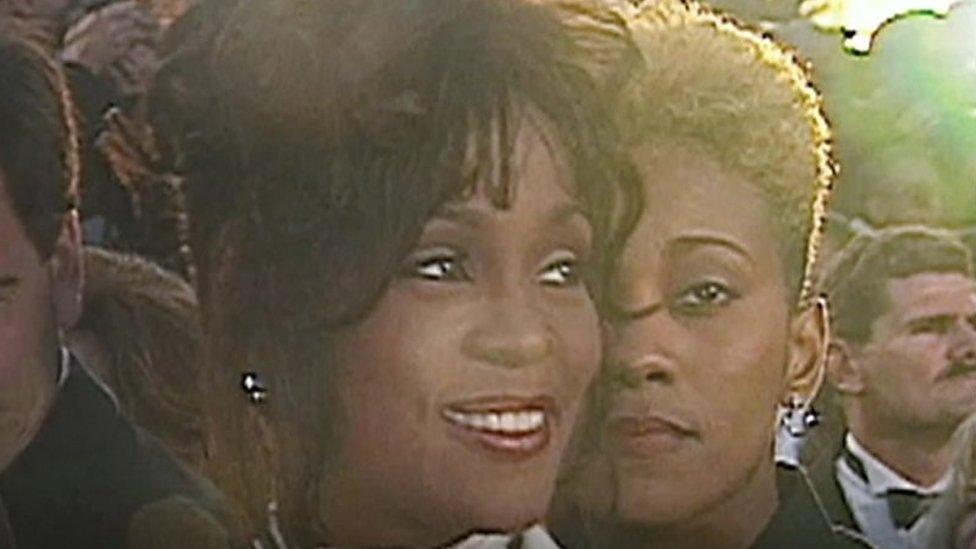Robyn Crawford says relationship with Whitney Houston was 'love - open and honest'
- Published
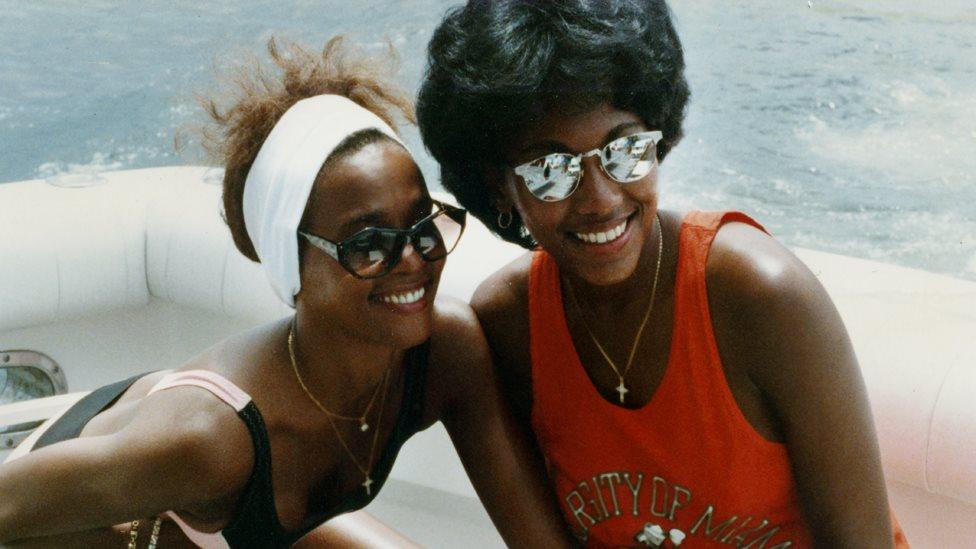
Whitney Houston (left) and Robyn Crawford relax on a yacht during a break on her 1987 Australian tour
Robyn Crawford was Whitney Houston's best friend. A childhood confidant who became her assistant and creative partner. They were also, briefly, lovers.
For years, their romance has been the subject of rumour and speculation. Two recent films about Houston's life, Whitney: Can I Be Me and the family-sanctioned Whitney, raked over the coals of their relationship - suggesting Crawford was the real love of her life.
Crawford always declined to comment on her life with Houston - appearing in those films via archive footage, but never agreeing to an interview.
But now that everyone else has had their say, Crawford has decided to tell her story. "Why now?" she asks in the introduction to her new memoir, A Song For You.
"Believe me, I've done my best to stay out of the spotlight [but] I believe it is my duty to honour my friend and to clarify the many inaccuracies about myself and about who Whitney was".
She confirms, for the first time, her romantic history with Houston, which began when they were teenagers and lasted two years.
"It wasn't all about our sleeping together," she stresses in the book. "We could trust each other with our secrets, our feelings, and who we were. We were friends, we were lovers. We were everything to each other. We weren't falling in love. We just were. We had each other. We were one: that's how it felt."
Houston broke off the relationship just after she signed her record deal, handing Crawford a Bible and telling her she feared public exposure.
Whitney shared with me her belief that, if people found out about our relationship, they would use it against us.
Crawford remained a devoted friend and emotional bulwark, anchoring Houston to her past, and steadying the ship of her often-turbulent private life.
She candidly describes their drug use and how she watched, helplessly, as her friend's habit spiralled out of control.
"No matter what rules we came up with around responsible drug use, she kept breaking them and using whenever she wanted to," she writes.
By the time Crawford quit Houston's team in 2000, the star was cancelling shows and missing recording sessions. She suspected the singer was being physically abused by her husband, Bobby Brown, and had found burned spoons in her kitchen.
Crawford's own story isn't much happier - she is the daughter of a single mother, who left her husband after years of abuse; and lost two of her closest family members to Aids.
But the book isn't overwhelmingly bleak. After escaping Houston's orbit, Crawford slowly rebuilt her life, and is now happily married with two adopted children. She has worked as a journalist, interviewing the likes of Jessica Biel and Kristen Bell, and is currently a fitness trainer.
Her goal in writing the book was to erase the memory of Houston's tragic death, drowning in a bathtub on the eve of the 2012 Grammy awards, and remind the world she was "bighearted, unselfish, hilarious" and phenomenally talented - whether she was singing at the Super Bowl, learning to act on the set of The Bodyguard, or celebrating in church (where some parishioners were so overwhelmed by her vocals they would faint).
"I want to elevate her. I want to lift her so she can hold her legacy up way high," Crawford tells the BBC, as she recounts the making of her memoir.
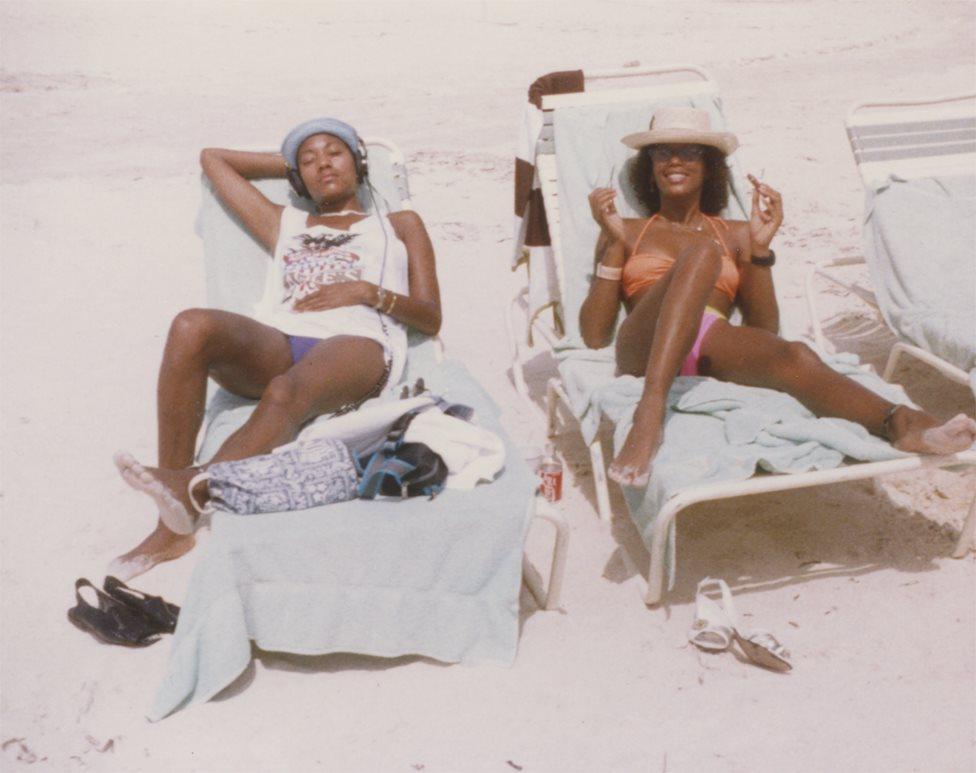
Crawford called Houston by her childhood nickname, "Nippy"
What was it like to rekindle all these old memories as you wrote the book?
I spent most of the last two-and-a-half years feeling and reliving the 80s and the 90s to the point that my son said one day, "I'll be glad when mom is finished writing this book, so she can play with me again".
It's really true, you know? Sometimes they would disturb me and I'd be in a thought, so it would be a delayed reaction, or I might snap at them. So I really was not the mommy that I had been, attentive to every little thing.
And the process of writing was like a roller coaster of emotions. The beginning, where we were bright-eyed, adventurous, fearless; then all the wild years achieving all the things we had talked about; and then my family and the challenges there. So there were tears of joy, tears of sadness, strain.
You speak about watching Whitney in the studio, and how she could breathe life into a song; but I wondered what it was like to hear her sing in private, at home or in the car?
I used to call that the pre-concert! We had this house in New Jersey and, in the great room, there was a dome. She would go into that room and just sing - gospel, jazz, Al Jarreau, whatever came to her - because the acoustics were like brilliant. I remember one night she was in that room singing Fly Me To The Moon, it was so effortless that it sounded like she really was flying.
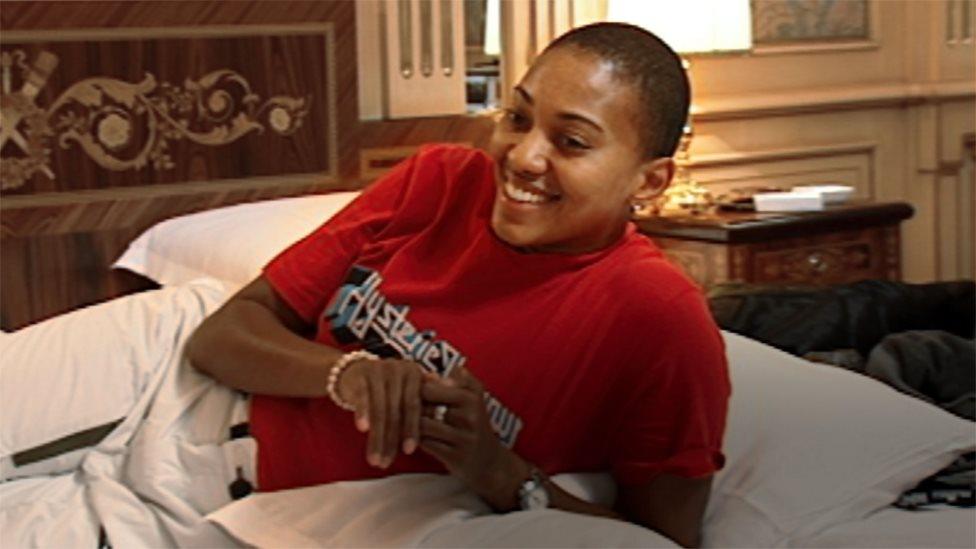
Crawford accompanied Houston around the world, working as her assistant and creative director
In those early days, it sounded like you had a lot of fun. Having water gun fights in hotel corridors and exploring the world together.
The one thing about Whitney is she was like a kid. She wanted to have as much fun as she possibly could.
I remember Whitney would rent out Lehigh University's arena in Pennsylvania to prepare for tours, and we'd always play football outside on their field. One time, for the last play, we told her, 'OK, the entire line is going to go right and we're going to block for you. You pause for a second, one second, and shoot to the right behind us.
"She said, 'OK, OK, OK'. But when we all went to the right, she went to the left. She ran right into one guy, they clipped knees and she toppled over. For the rest of the dress rehearsal, she couldn't wear her heels. So no more touch football for us. They killed it for everybody. After that, it was ping pong instead.
People will be interested to read about your romantic relationship with Whitney. The way you describe it is very tender and moving - but at the same time it's no big deal. You say you "never talked about labels, like lesbian or gay," it just was what it was.
Mmm-hmm, that's just how it was.
People pull it out as a relationship - but we met and we clicked and we became friends. We built that friendship on being open and honest with each other about everything. She told me she was going to sign this [record] deal and she was going to take me with her all around the world. And along the way, we had an intimate, loving, physical experience of friendship within our friendship. It was love and it was open and honest.
Whitney ended the relationship shortly after signing her record deal, telling you "it would make our journey even more difficult". How hard was it to put those feelings to one side and just be friends?
Well, we were friends - and we knew each other very well.
The focus was always where we were going. Nothing could stand in the way of that. Whitney shared with me her belief that, if people found out about our relationship, they would use it against us. And it was the 80s. You were either this or that. And women were treated in a way where they were rivals and not comrades. So it was a lot and we were young. We were young, but we were fearless.
In a way, you protected each other.
That was very important. Whitney said "I want you right here. You know me. You knew me before we got where we were going." So we were a team. She knew me and she trusted me.
Allow YouTube content?
This article contains content provided by Google YouTube. We ask for your permission before anything is loaded, as they may be using cookies and other technologies. You may want to read Google’s cookie policy, external and privacy policy, external before accepting. To view this content choose ‘accept and continue’.
I was struck by your mum's first meeting with Whitney, where she says, "You look like an angel, but I know you're not". And then, a few days later, Whitney presents you with a joint for the first time.
My mother had her right! Whitney had this angelic radiance about her. And then she pulled a joint out of her breast pocket as if to say, "Yeah, I do this too, OK?"
The two of you did drugs together often, but eventually you tried to talk her out of kicking the habit. Do you think she ever made a serious attempt at giving up?
We never believed cocaine was a good thing; and in the early years she'd say to me: "This cannot go where we're going". So I believe for sure that Whitney knew she needed to help herself and wanted to do that.
I write about it in the book that she called someone for help.
Yes, this is in 2001 - she called a doctor to discuss rehab.
Yes, Dr Richard Frances. She called him herself. And she said she was not someone who wanted to die. She was someone who wanted to live. She meant that.
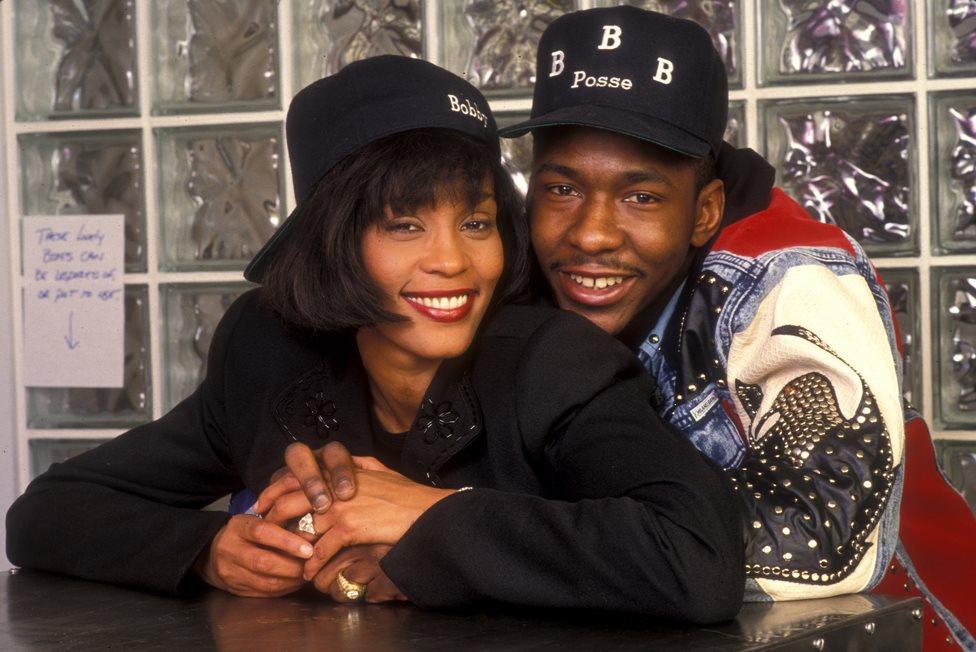
Crawford was a maid of honour at Houston's wedding to Bobby Brown in 1992
The public perception is that things took a dark turn when Bobby Brown turned up on the scene. That seems to be a dividing line in her life and her career.
Well, I think people feel that way because it was covered so wildly and consistently in the tabloids in the mainstream media, so I believe that's where the public gets that over-reaching narrative.
Do you agree with that narrative?
Well... Obviously, I was still there at that time. And there were, let me say, a lot of 'distractions' during that time. But Whitney was still working and achieving during those times of career. I mean, she had film projects...
She made The Bodyguard and Waiting To Exhale when she was with Bobby, right?
Right. But what I will say is that she was exhausted.
I guess when you're working hard, and home life is turbulent, there's no respite.
Yeah. Everything came back to her. She was dealing with all of it and she wasn't getting the rest and the quiet she needed.
But the same was true for you. At the same time as you were working for Whitney, you were caring for two family members with Aids. Did you ever have enough time for yourself?
No, and you do lose your identity. I really didn't know who I was. So when it was all said and done, I write in the book about how I had to find Robyn again.
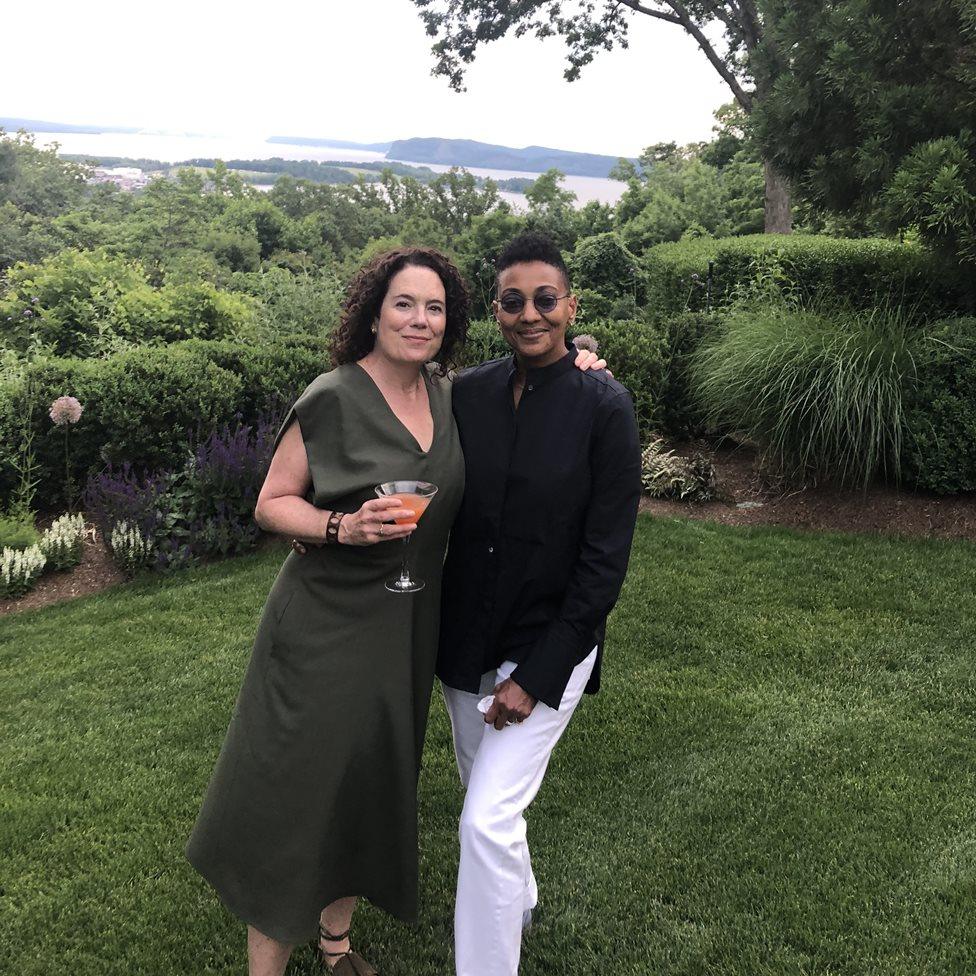
Robyn met her future wife while working on The Bodyguard
Lisa Hintelmann, who is now your wife, said she couldn't start a relationship with you unless you agreed to have therapy. She sounds incredibly wise.
Oh yeah. Lisa has been my Rock of Gibraltar. She let me know that she loved and cared about me, but that I needed to help myself.
She gave me shelter and a place to hide, because when you feel like that, you just want to be alone. So it was a dark time for me, but she got out of my way, and just let me crawl until I climbed back up.
You consciously left the entertainment industry, and went to work in a tennis club and on a farm, where you picked fruit. What was that like?
Manning the desk at the tennis club wasn't for me, you know? But I loved the farm. No-one knew me, and I loved being outdoors. I stayed the entire summer season and I got a lot of asparagus. I love asparagus to this day!
Allow YouTube content?
This article contains content provided by Google YouTube. We ask for your permission before anything is loaded, as they may be using cookies and other technologies. You may want to read Google’s cookie policy, external and privacy policy, external before accepting. To view this content choose ‘accept and continue’.
Shortly before Whitney died, you gave away some of the mementoes of your time together. I wondered what you parted with, and what you decided to keep?
I presented a lot of gold and platinum discs to the Whitney Houston Academy of Performing Arts, which is the grammar school that she attended. But I kept the plaques for The Star Spangled Banner and her first single, You Give Good Love. And I kept letters from people around the world, heads of state like Nelson Mandela. All my tour books I kept, you know, different notes, And the Bible Whitney gave me, I kept.
Do you still listen to her music?
After I left the company, I didn't listen to her music for a while. And then one day I listened to Exhale. which was one of my mother's favourites. And then I played The Greatest Love Of All for my daughter and she loved it. I mean, I found her playing it in her room on her Alexa. And so, lately, you know, I have a couple of favourites including the Preacher's Wife.
So it's mainly the gospel songs?
Oh, yeah. I mean, I listen to a lot of gospel music, and even if it's not the Preacher's Wife, it is the gospel music that Whitney played - like Fred Hammond, Yolanda Adams, Persuaded, Through The Storm. She loved gospel music. It's the music she loved to sing most.

Follow us on Facebook, external, or on Twitter @BBCNewsEnts, external. If you have a story suggestion email entertainment.news@bbc.co.uk, external.
- Published15 October 2019
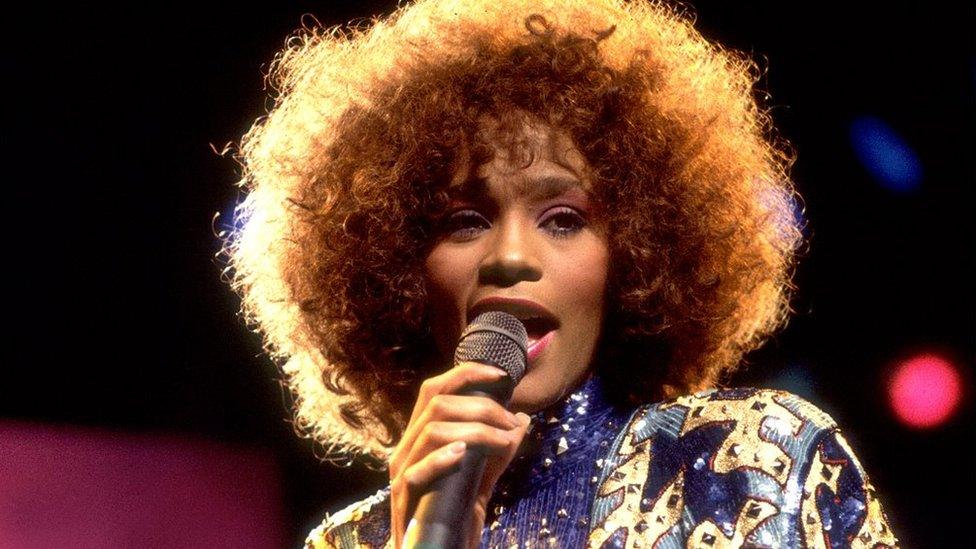
- Published22 March 2012
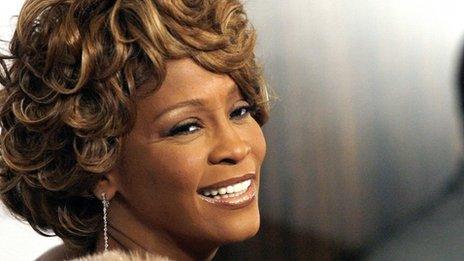
- Published16 June 2017
